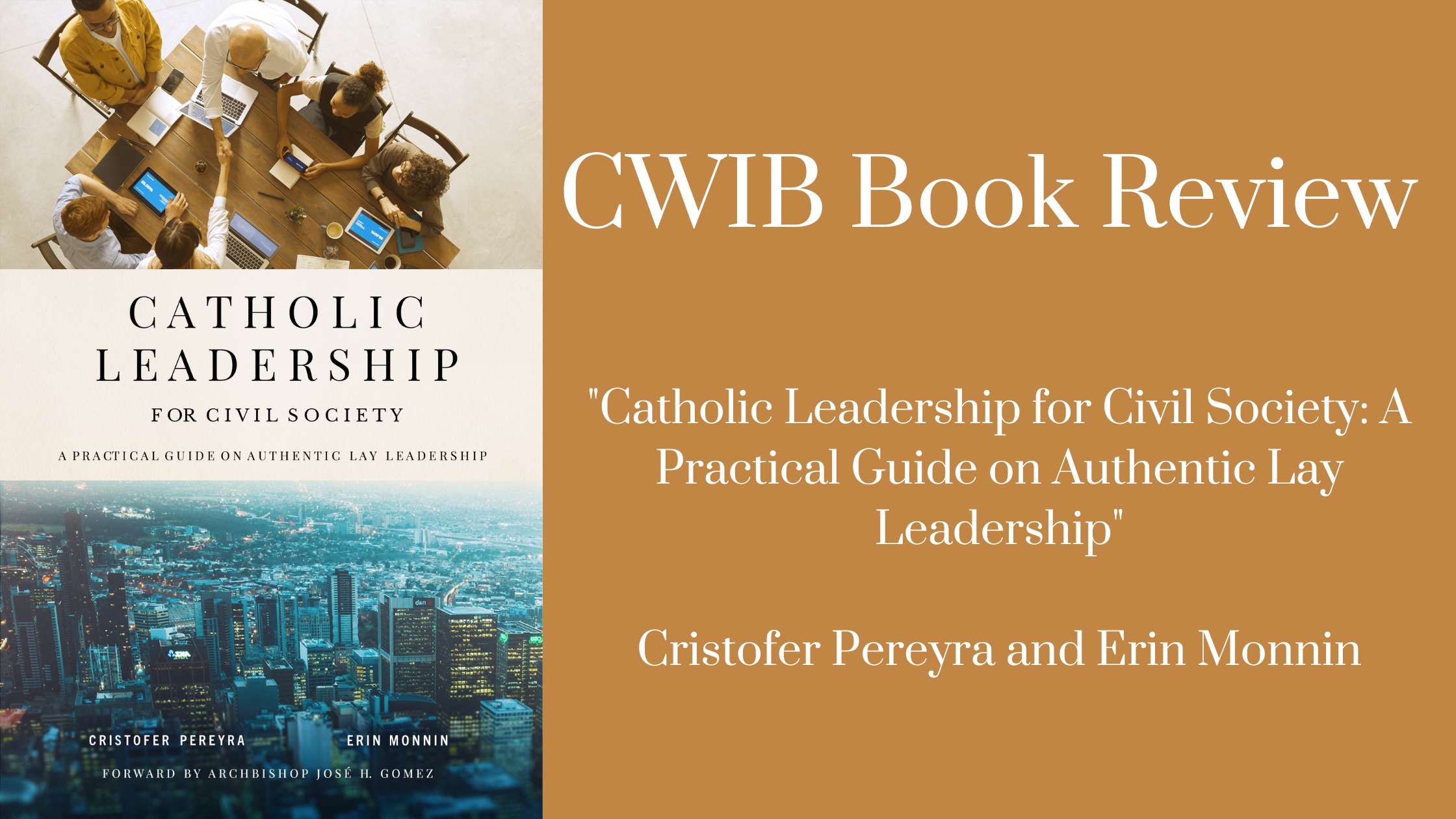CWIB Book Review: “Catholic Leadership for Civil Society”
“For their pastors know how much the laity contribute to the welfare of the entire church” (Pope St. Paul VI, “Lumen Gentium”).
Especially when times are troubling, we look to our leaders for direction and action. However, many of us may need to take a look in the mirror and ask ourselves whether it is time to step into that role and accept the calling we received at Baptism. The Church needs our efforts as the laity (all the faithful except those in holy orders or a state of religious life) to provide direction and action to support our communities.
This proposal may seem daunting, and we may feel that we need to do something “big” to have an effect. However, such work is most effectively carried out person to person, co-worker to co-worker, neighbor to neighbor, and parent to child. It is slow and sometimes painstaking, but it is where the sweetest fruits are born. These small but valuable steps in the community are a significant element of the laity’s leadership role.
In “Catholic Leadership for Civil Society, A Practical Guide on Authentic Lay Leadership,” Cristofer Pereyra (CEO of Tepeyac Leadership, Inc.) and Erin Monnin (development officer at the Society of St. Vincent de Paul) address the everyday businessperson, parishioner, volunteer, and sinner answering the calling of the “baptized children of God.” The authors note in particular that professionals “must make their field this mission.”
Pereyra and Monnin write that especially in a post-pandemic atmosphere, the Church desperately needs the laity to help lead in civil society and “help save the Church.”
For the “Betterment of Humanity”
Although we often think of leadership in terms of the position we hold, Pereyra and Monnin believe that we should consider leadership in terms of the virtues leaders exhibit and how those virtues result in the “betterment of humanity.”
Providing food for thought about how the laity can lead, the authors note that Catholics should reflect on what the Holy Spirit has planted in them by:
Studying an issue from a Catholic lens.
Praying.
Reflecting on whether the Holy Spirit has created a strong interest in a particular area.
This process will inspire Catholic professionals to “[roll] up their sleeves” and become servant leaders in their community. The authors reiterate often that it is our duty as lay leaders to “influence the world for Christ.”
Pereyra and Monnin propose that we think differently about the most effective ways to serve God. One approach is to realize that we spend a lot of our waking day committed to our profession and that we must be faithful Catholics at work as well as in our off time, acting as servant leaders in all areas of our life.
Overcoming the Hesitation to Lead
Pereyra and Monnin acknowledge that given the state of the world today, it can be overwhelming to consider a leadership role. They encourage us to pursue doing so with prayer, hard work, and determination. One particular line that caught my attention was that “the biggest threat our world faces is that many people have the false belief that we, as humans, can dictate the Truth to God, our Creator.” The authors add that it does take determination to “reclaim the Truth of our Faith within our Church” and then to go out into the world and do the same.
A Roadmap for Leadership
Before diving in, the authors encourage readers to develop the fundamentals for civic leadership, which include a solid understanding of:
Character (including prayer, examination of conscience, and mortification).
Human dignity (who we are, where our dignity comes from, and what threatens our dignity).
Catholic social teaching (as a valuable guide for human behavior).
Next, Pereyra and Monnin encourage readers to consider how they might apply these fundamentals as a Catholic leaders, specifically in education, health care, immigration, business, media, and government. They note there are valuable opportunities for the laity to provide insight in these areas by participating on local nonprofit and school boards. The authors also share examples of laypeople who incorporate their faith into their professional practice.
Baby Steps for Laity Heading into Leadership
From the beginning to the end of the book (including an impressive appendix), it is clear that the authors seek to inspire, instruct, and encourage the laity to take their first steps into leadership roles. I believe that many readers will use the spark the book ignites to address the numerous needs of the Church and humanity. Perhaps the authors’ most important recommendation, which also happens to be simple and unintimidating, may be to ask ourselves this question: “How can I serve and uplift those whom I will encounter today?” The answer to that question is a good first step.
Linda A. Burrows is an attorney specializing in trust and estate law in southern California. She studied journalism at Cal Poly, San Luis Obispo, law at Pepperdine, and tax law at Georgetown. Linda is the founder of Soul Soda, a non-profit with the mission of refreshing faith in those, particularly Catholics, who are feeling disconnected from their religious roots. She is a wife and mother of three teens. Linda’s Confirmation name was that of St. Gabriel the Archangel.

